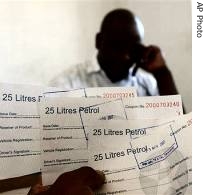2007年VOA标准英语-Zimbabweans Abroad Find Creative Ways to Suppor(在线收听)
London
18 June 2007
Many Zimbabweans have left home in pursuit of better lives elsewhere, as the country's economic meltdown worsens. From London, Tendai Maphosa looks at how some of them are finding innovative ways to help those they left behind.
The economic and political crisis in Zimbabwe has led to an exodus of an estimated three million skilled and unskilled workers from the country, mostly to South Africa and Britain.
As Zimbabweans increase their earning power abroad, they are finding creative ways to help out their loved ones at home.
A spokesperson for a Zimbabwean-owned company based in Britain told VOA that it transfers thousands of pounds every week to Zimbabwe through deposits into the company's account or by making an Internet banking transfer directly to a person's bank account in Zimbabwe.
By making such transactions, the Zimbabwean government, chronically short of foreign exchange due to its overvalued currency, is cut out of the large amounts of cash sent to Zimbabweans. As a result, the money goes directly into the pockets of Zimbabweans without them having to pay large transaction fees or higher bank rates.
Daniel, a Zimbabwean who has lived and worked in Britain for the past five years, explains.
"If you do it officially through the banks, they are going to short change you in the sense that the bank rate is not as good as what these money changers give us," he said.
 |
| Unidentified man inspects his fuel coupons in Harare, after receiving them from a relative in London via Mukuru.com, 12 Jun 2007 |
Mukuru.com founder Rob, who asked VOA to protect his identity, explains how people get privately imported fuel in Zimbabwe.
"They pay for say 60 liters of fuel. Like any e-commerce Web site, like Amazon or eBay you got a shopping cart, you add some fuel to your shopping cart and then you proceed to the checkout," said Rob. "There is one additional step on Mukuru, when we ask for the recipient's details you specify their mobile number and instantly you can pay with credit card or Pay Pal, wire transfers or cash deposit instantly. You pay for this order and SMS will land on your recipient's handset in Harare and they can go to our coupon office and collect the fuel."
Rob's company also pays for satellite television subscriptions. These must be paid for in foreign currency as the satellite company is based in South Africa. Satellite television has become an important alternative source of information as the government has a monopoly on the electronic media in Zimbabwe.
Rob's growing company is expanding to other African countries and will include ways to pay for pay-as-you-go mobile phones from Britain for those back home.
University of Zimbabwe economist Tony Hawkins told VOA that a study by the institution carried out two years ago, showed that about half of the urban population are reliant to some extent on money from the diaspora.
"With the collapse of the Zimbabwe dollar, the one way you can stay ahead of the game is to bring in money from outside, change it on the parallel market and then you can afford to live," said Hawkins. "That is why the best lifestyles are those enjoyed by the expatriate community, the diplomats, and the so-called aid agencies who are bringing in money from outside changing it on the parallel market. Things are cheap in Zimbabwe if you are paying in foreign currency."
Hawkins added that money from the diaspora is keeping a lot of businesses afloat.